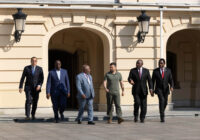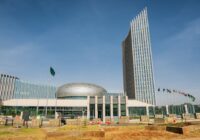This year, China could pull ahead of the US and become Africa’s biggest trading partner, according to David Shinn, a former US ambassador to Ethiopia and Burkina Faso and an expert on Chinese–African relations. Meanwhile, although both Europe and the US have a longer tradition as foreign direct investors in Africa, China is catching up — and its interests reach beyond trade and commerce, says Shinn, who is the co-author of forthcoming book on China–Africa relations. In an interview with China Knowledge at Wharton, Shinn dissects the country’s aid and development strategy in Africa and explains why it has a steep learning curve ahead.
An edited transcript of the conversation follows.
China’s Strategic Economic Zones in Africa
China Knowledge at Wharton: At the African Summit in February, Robert Zoellick, the head of the World Bank, briefly mentioned the Oriental China Ethiopia Industrial Zone, which China is setting up to promote various industries and serve as a trading hub. Is this indicative of how China is forging a greater presence in Africa and if you could summarize in one point what it is that China is doing in Africa, what would it be?
Shinn: I would hesitate to narrow it down to such a small point. It’s done four major things in Africa, but if you want only one, the way I would summarize it as increasing economic and business collaboration with Africa. That is a huge topic in and of itself, but as I said, that is only one of four major objectives that China has in Africa.
The economic zones you identified … actually began in China, and over the last several years China has decided to expand the concept to Africa and maybe beyond Africa. I don’t try to suppose China’s activities in the rest of the world, but I wouldn’t be surprised if they are doing this elsewhere.
At the Forum on China–African Cooperation in Beijing in 2006, they agreed to create six of these zones in Africa. They have already done or committed to doing eight in Africa, and one of these is in Ethiopia. That one is further along than several others, with the one in Zambia being the furthest along … This is certainly a unique Chinese approach to Africa. No Western donors do this sort of thing.
If you wanted to use this as a microcosm of what they are doing in Africa, it could be illustrative. But if you narrowed it down to that, you would sort of miss 90% of what they are doing in Africa.
Four Pillars of China–Africa Relations
China Knowledge at Wharton: Could you elaborate on the other areas?
Shinn: There are four interests that China has in Africa. The first one, which in my view is the most important, is to develop and retain access to Africa’s raw materials, such as oil and minerals. Agricultural products are also becoming more important.
Number two is a political goal. That is to develop or maintain relations with as many of Africa’s 53 nations as possible, so that China can draw upon their support in international settings, such as the United Nations or World Trade Organization, or some of the specialized agencies of the UN where numbers count and China might occasionally run into difficulties. If China has the support of most of the 53 countries, it has a big block of votes for defending its position, particularly in a place like the UN’s Human Rights Council.
Interest number three is getting Taiwan out of Africa, at least politically and diplomatically. They don’t care if Taiwan has trade offices or is involved economically on the continent. In fact, there are even instances in which Beijing and Taipei collaborate in Africa on some economic issues.
Four African countries still recognize Taiwan — Sao Tome, Swaziland, Burkina Faso and Gambia. These are not important countries, but they don’t care … it’s four votes, it’s four countries. Now it flies in the face of the whole “One-China” policy [in which China forbids countries that want to maintain diplomatic ties with it to not have official relations with Taiwan].
Economic Interests and Trade Growth
The fourth interest relates to the business component of developing Africa for China’s export market. Today, Africa trade is only 4% of China’s global trade, which is not very much. But it was only 2% five years ago, so it’s growing exponentially. If it gets up to double digits, which it probably will in the not too distant future, it starts to be big trade. 10% or more is fairly big even for China. Of course, it’s far more important for Africa. I don’t know what the global percentage of African trade with China is, but it is far above 4%.
Looking at it from the African perspective, it is like one of these horns that you use at a football game where China has the small end and Africa has the big end. Africa is very interested in increasing its exports to China and it is becoming a very important market. But since we are looking at China’s interests, we are looking at only 4% of its global trade at the moment, but it is looking to the day I’m sure when that is in the double digits.
China’s Aid and Development Strategy in Africa
China Knowledge at Wharton: How would you define China’s aid to Africa? And in what ways is it providing sustainability and preventing future problems rather than being reactive?
Shinn: Defining aid is difficult for any country. In the West, at least you have the OECD Development Assistance Committee definition of aid, which the West agrees to. But it is not really used by China and it’s one of the explanations why you cannot get aid figures out of China. They don’t announce global figures. They’re just not available. One of the concerns is that the Chinese haven’t quite ascertained what constitutes aid.
Take the huge loans to Angola. They are loans. Normally, you don’t think of a commercial loan as aid because you’re making money. However, most of these loans are concessionary. When I was in Angola, I was told by the minister of finance that some of the loans had interest rates as low as 0.75% to about 1%. You can probably legitimately say the concessionary component of that loan is aid. I’ve looked at this issue pretty closely and [American University professor] Deborah Brautigam has just written a book on this [The Dragon’s Gift: The Real Story of China in Africa]. She and I agree on the amount of aid [from China], in the OECD context, is about$1.5 billion per year to Africa.
[Knowledge at Wharton first published this piece.]
The views expressed in this article are the author’s own and do not necessarily reflect Fair Observer’s editorial policy.
Support Fair Observer
We rely on your support for our independence, diversity and quality.
For more than 10 years, Fair Observer has been free, fair and independent. No billionaire owns us, no advertisers control us. We are a reader-supported nonprofit. Unlike many other publications, we keep our content free for readers regardless of where they live or whether they can afford to pay. We have no paywalls and no ads.
In the post-truth era of fake news, echo chambers and filter bubbles, we publish a plurality of perspectives from around the world. Anyone can publish with us, but everyone goes through a rigorous editorial process. So, you get fact-checked, well-reasoned content instead of noise.
We publish 2,500+ voices from 90+ countries. We also conduct education and training programs
on subjects ranging from digital media and journalism to writing and critical thinking. This
doesn’t come cheap. Servers, editors, trainers and web developers cost
money.
Please consider supporting us on a regular basis as a recurring donor or a
sustaining member.
Will you support FO’s journalism?
We rely on your support for our independence, diversity and quality.










Comment